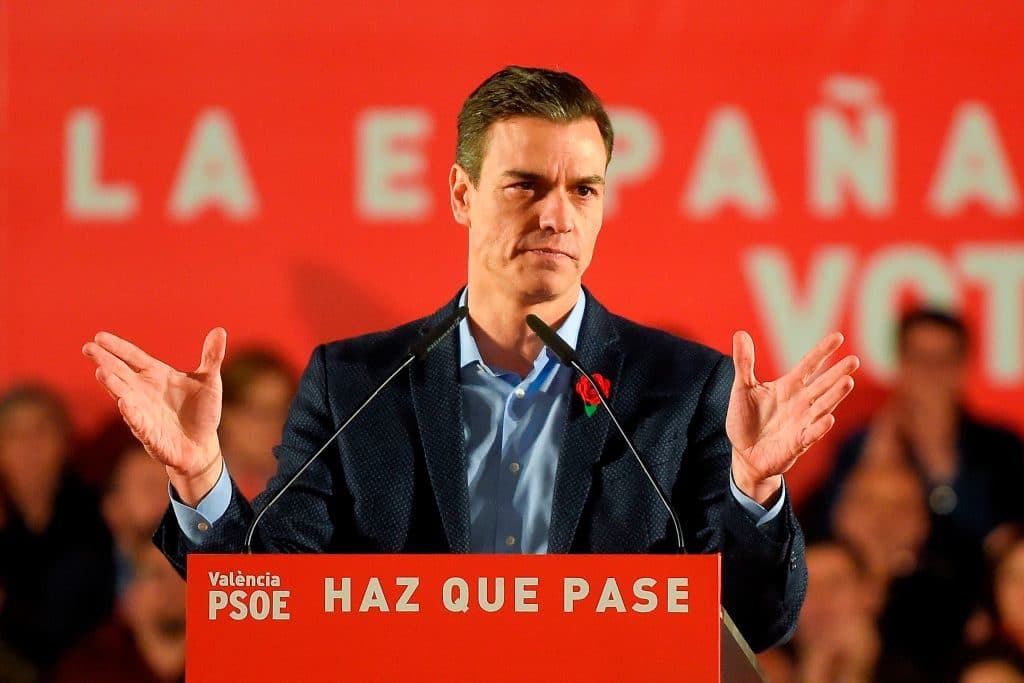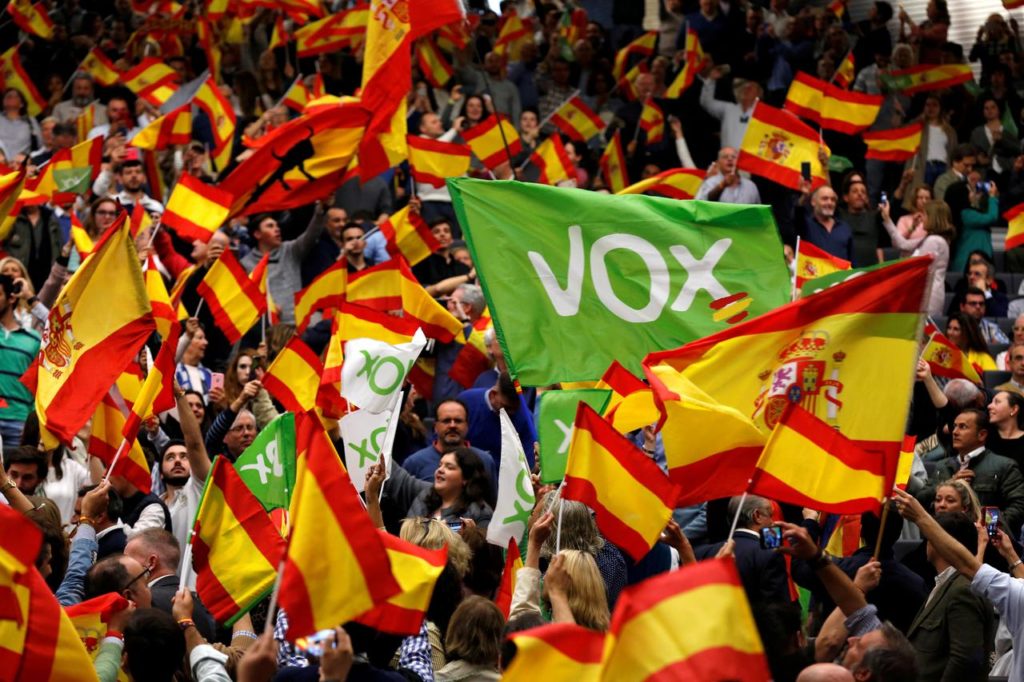Elections in Spain

The 2019 Spanish general election for the 13th Cortes Generales of Kingdom of Spain was held on Sunday, 28 April 2019. All 350 seats in the Congress of Deputies were up for election, as well as 208 of 266 seats in the Senate.
The Spanish party Partido Socialista Obrero Español PSOE (Spanish Socialist worker’s party) clearly won 123 out of 350 of the parliament. Though the victory of PSOE was astonishing but, their total seats won falls short of a majority needed to take outright control of the government. Therefore POSE is ready for the negotiations with Unidas Podemos (a Spanish political party) in order to form coalition government as a leftwing with Pedro Sánchez being the leader.
With turnout being 75.8% the ruling party PSOE won its first nationwide victory with 28.7% of the share and 123 seats. Improving by 38 seats from the last elections on the cost of leftwing party Unidas Podemos. For the Spanish Peoples’ party under Casado it turned out to be the worst elections ever after their seats being reduced to 66 seats and 16.7% of the share. The far-right Vox party was not able to perform well though entered Congress for the first time but failed to fulfill expectations The division of the right-of-centre vote into three parties mitigated the entrance of any other alliance and it enabled to make sure that no other party or alliance would stop POSE from forming the government.
Development of Political Life
Since the formation, Spain has been witnessing political ups and downs be it the political parties’ reign or be it the dictatorship. The Circumstances were quite hot immediately before the elections, and there were rumors of the early elections. Fortunately it didn’t happened and the elections took their original time to held. As the Spanish party PSOE has won the majority votes but it not able to capture the absolute majority. Therefore the circumstances could take sharp turns as to with whom the party is gonna make coalition. With the attitude of the party and as said above the party could make coalition with another party Unidos Podemos.
After a coalition we can see a government in Spain that will believe in democratic socialism and an environment that will nurture and promote social justice in the society. There isn’t any vast different among the political charter of both the above parties. Therefore it can be said that Spain would benefit greatly from their mutual agendas of social justice, democratic socialism and left wing populism. After the successful coalition we would see an environment of self management and a state that will believe in the conversion from capitalism to socialism. Moreover, it can also be predicted that the Spain would emerge as a decentralized planned social economy. Social democracy supports the economic and social interventions to promote the social justice in the society. In term of financial figures it is predicted that in this tenure of government Spain would experience an average growth in Real GDP being 2.1 percent as compared to the previous tenure at 2.5 percent.
Coalition with Left Wing
As discussed earlier there are obvious chances that PSOE might form a coalition with Unidas Podemos (UP). Having said that, if we look at the total won seats which are 123, and is significantly less than the required to form an absolute majority which is 176. Therefore, the possible coalitions with the other wings are under consideration. Out of all the possible combinations the coalition with the UP is most favorable. Because both the parties have a friendly relationship between them unlike with the other political parties. UP leader Pablo Iglesias has already given his consent to form a coalition with the PSOE, while the PSOE has yet to comment on the situation. Even if the coalition do occur still the alliance will fall short of only 11 seats in the parliament to attain the absolute majority. For acquiring the remaining seats to attain the absolute majority, the party needs to get the consent of the smaller regional parties. These parties include Basque Nationalist Party, Convergence and Union and the Republican of Left Catolonia. But, even after the proposed coalition PSOE will still require one seat for the absolute majority. The challenge for the party lies in gaining that one seat. Because of the fact the other parties like Citizen’s Party/Cuidadanos are found to have an attitude of opposition for the PSOE. Though the consequences of the coalition with this party is discussed in the forthcoming sections, it can be predicted that this coalition is not feasible.
No Coalition and Plurality Voting
As discussed in the above section, though the UP was a best coalition for the PSOE but, as the circumstances are prevailing it would be enough to attain an absolute majority. One more considerable option that is left apart from the coalition government is Plurality voting when there is no possible coalition between the parties and it the option permitted by the law for the feasibility of the majority attaining party. Plurality voting is distinguished from a majoritarian electoral system, in which, to win, a candidate must receive an absolute majority of votes, which means more votes than the combined votes gained by all the parties. In this method of election there are two rounds of voting. If in the first round a candidate is able to achieve more than 50 percents of the most the candidate is declared successful. Else, another round of voting is set up with the top candidates from the first round and the candidate receiving more vote in second round wins. This ensures that the successful candidate is made by receiving most votes from the parliament. This option can benefit the party who cannot manage to form an absolute majority government due to number of factors. Alternatively, the PSOE can engage in this voting to achieve a relative majority.
Coalition with the Centre-left party Ciudadanos
We have already seen the coalition possibilities for the PSOE but none of them seem to satisfy the requirement for the absolute majority. Though the option of coalition with Cuidadanos is the most feasible and beneficial for the party. But, this coalition is not quite easy since the general attitude of this party is not good towards PSOE. Infect the representative of the Cuidadanos said that they want to make an opposition against the PSOE. Also, the Ciudadanos leader Albert Rivera, built his campaign on disparaging Sanchez, criticizing his attempts to negotiate with Catalan separatist parties in a bid to ease a secession crisis in the northeastern region.
Tough politically it is being recommended by the business and finance sector the two parties should make an ally but, the general attitude of both the parties doesn’t really seems to accompany this idea. The situation can easily be interpreted through the crowd chanting “Not with Rivera! Not with Rivera!” outside PSOE headquarters in Madrid’s Calle Ferraz, a smiling Sánchez replied, “I think that’s pretty clear.” As the above scenario for coalition fails the party has to go with other options discussed above. Though none of the combinations are final yet and the party has yet to decide with their political stance.
How important is this election: A conclusion
As we know that the Spain has witnessed very critical and sensitive circumstances and keeping in mind, all those situation, we can say that these elections are very much important for the future political life of the Spain. As the circumstances have left the PSOE in the situation of political confusion regarding the formation of coalition. It will be important to know the final stance of the party before all procedures. The aftermath of any coalition or no-coalition at all will decide the future of Spain. As to now, we have already studied the available choices to the party and have also tried to narrow it down on the basis of its feasibility. Now it’s totally up to the party leader how he would proceed. May the best prevail in Spain? Peace!













